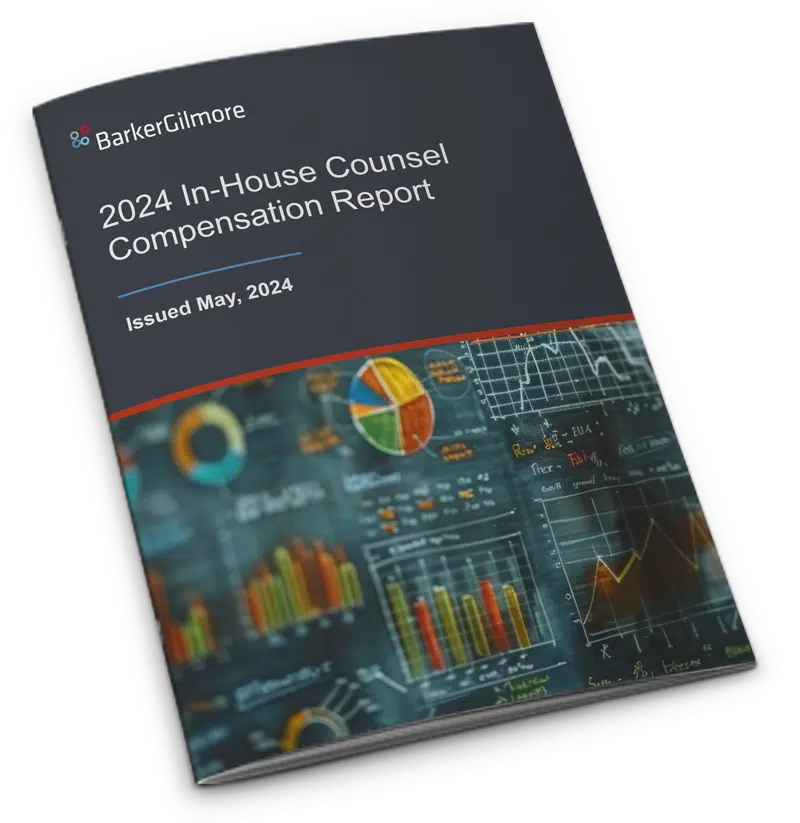Contributors: A.B. Cruz III | Haydee Olinger
Securing top-tier leadership positions like General Counsel (GC) or Chief Legal Officer (CLO) demands more than just legal acumen in the dynamic landscape of corporate legal affairs. It requires a strategic approach, honed leadership skills, and a clear personal strategy. Executive coaching emerges as a critical ally in this journey, offering invaluable guidance and insights to navigate the complexities of modern corporate leadership.
The GC AdvantageSM webinar, “The Transformative Value of Executive Coaching for In-House Counsel,” explored how executive coaching can help develop a personal strategy for professional growth and obtaining a GC position. This article is a summary of our discussion.
The Crucial Role of Executive Coaching in Legal Department Succession
One of the critical findings of BarkerGilmore’s 2024 Aspiring General Counsel Report was that in-house counsel who received executive coaching were more likely to be identified as a successor to GCs than counterparts without executive coaching. The percentages are roughly 35%, with executive coaching more likely to be identified as a positive factor in becoming a successor to those positions, as opposed to 26% without executive coaching.
Also, the survey found that 37% of Managing Counsel and 20% of Senior Counsel have worked with an executive coach in their current position. With that, the coach was most likely to be with an external service provider for both Managing Counsel (91%) and Senior Counsel (74%).
Managing Counsel and Senior Counsel each found coaching to be “very valuable” or “extremely valuable,” with just over two-thirds of both Managing Counsel and Senior Counsel saying as much.
Finally, management-identified successors generally receive professional development at higher rates than Managing Counsel or Senior Counsel. A recurring theme is that executive coaching can prove to be highly valuable.
Listen and Communicate
Listening and overall communication skills are two valuable areas in executive coaching. We have seen repeatedly that a candidate needs to be aware of the importance of doing what it takes to enhance self-awareness and emotional intelligence.
With that, executive coaching is a positive step – whether an organization is asking in-house counsel to participate or whether the opposite is true (in-house counsel asking if they can participate). With rare exceptions, executive coaching is viewed in most organizations as a positive, strategic step to growth. Naturally, an employer financing the executive coaching program is vested in the recipient’s career and success.
That’s precisely why the above-mentioned BarkerGilmore report highlights the value and impact executive coaching can have on the General Counsel career path – executive coaching is a proven differentiator. Frankly, in today’s environment, a company that does not offer extras, including executive coaching opportunities, for in-house counsel is not thinking competitively.
At BarkerGilmore, we have found that executive coaching has extended to staff at mid-levels of corporations. It demonstrates that employers are committed and willing to invest in high-potential, high-performers who can impact the bottom line.
One of the critical things about BarkerGilmore’s typical engagement is working with the client to determine the best fit. The BarkerGilmore executive coach is unique in that the coach is someone who previously served in a General Counsel or Chief Compliance Officer role. This fact enhances the ability to assist and coach the client. At BarkerGilmore, we have found that a six-month engagement is the optimal time frame for our customized “flex to fit” coaching option. It starts by talking to the client to determine whether the firm is a good fit and compatible with their view of executive coaching as a positive program.
More Than Just Going Through a Program
Those going through executive coaching should never go through the motions and believe they are done. The process can be considered just the beginning. Beforehand, the firm queries potential clients where they might see the pluses; BarkerGilmore must understand what the person being counseled (and the employer) expects to get out of the engagement. Next, we conduct a personal 360 assessment, and the client provides a shortlist of individuals — superiors, peers, and those who report to the candidates — and we typically talk to each of those groups under strict confidentiality.
In our experience, everyone in the 360-review process is very respectful in their responses. They are equally good at offering positive feedback and surfacing potential areas where candidates can work for future growth.
Next, BarkerGimore develops a program that meshes with the areas where the coachees want to grow and flourish. One thing we truly appreciate about these coaching engagements is that talking about the process for an actual coaching program opens extremely positive conversations about the person’s current position.
BarkerGilmore requires that those considering working with us, either via employer or self-paid coaching, have an in-depth conversation with us first. For our firm, it’s a differentiator that often drives robust discussions during the process – and not just about leadership/command presence. For example, we can discuss and explore situational, live scenarios in a confidential setting.
Experience Matters
BarkerGilmore believes that the true value of executive coaching comes from experience. Specifically, experience with clients and what they have communicated definitively helps us develop insights into someone’s leadership and communication style — the discussions about where opportunities may sit, and one’s continued growth in an organization are valuable. At BarkerGilmore, we are doing our best to provide that insight.
One thing we see across many client engagements is the desire to improve executive presence, which entails several elements. We will work through those various elements during the entire engagement.
Returning to the need for building emotional intelligence, everyone has blind spots. No matter how talented or intelligent a person may be, they will have blind spots. It is essential to know what those blind spots are, and once you can identify them, work with yourself and your coach to lay out a plan on how to jettison them.
Our team believes that executive coaching will benefit the person receiving that coaching. We hope everybody realizes that as you make the professional climb wherever you are, if you want to grow and bloom, you can’t do it alone. There needs to be honest conversations. Indeed, coaching has a place in that strategy; sometimes, it does take a village to help one lead with their best foot forward.
Coaching means listening to what the coach has to say. At the same time, it’s a two-way street: a coach must listen well to guide the process effectively. A point here: the experience and backgrounds you can find among coaches include finding someone in your field, which can drive even more compatible unity among the participants.
No matter where you are in the chain of professional development, it’s not only about yourself; it also involves those around you. That means as you hopefully do that professional climb — and certainly when you finally get to where you always wanted to be — make sure you take care of those following in your wake because one day, you may be able to help create similar opportunities for them.
Nurturing Success: The Role of Executive Coaching in Cultivating Organizational Excellence
At BarkerGilmore, we frequently connect with CEOs, CHROs, General Counsel, and Chief Compliance Officers, and it’s a resounding positive in their belief that executive coaching can be one of the most powerful tools to help improve the performance of those on their team.
In today’s tight labor market, with the need to retain top talent skyrocketing, executive coaching is a fantastic tool to demonstrate to the professionals within the organization how much they’re truly valued. They need to trust that the organization wants to develop them — help them be everything they can be for themselves and the organization.
As always, reach out anytime if you or your organization may benefit from our recruiting, leadership development, or legal and compliance department consulting services.
Haydee Olinger, A.B. Cruz III, and our team of professionals are happy to help accelerate the initiatives that you’re already pursuing or to supplement your current strategic thinking to help you realize your vision. Please reach out if you or your organization may benefit from our recruiting, leadership development and coaching, or legal and compliance department consulting services. Let BarkerGilmore help you build and optimize your legal and compliance departments.
Connect with a legal recruiting advisor
* indicates required fields







